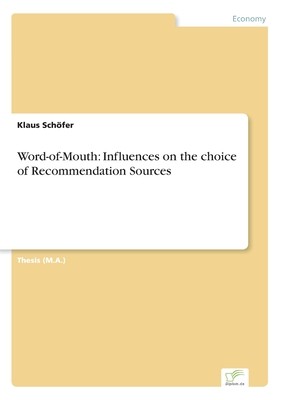
- We will send in 10–14 business days.
- Author: Klaus Schöfer
- Publisher: Diplom.de
- ISBN-10: 3838641450
- ISBN-13: 9783838641454
- Format: 14.8 x 21 x 0.6 cm, minkšti viršeliai
- Language: English
- SAVE -10% with code: EXTRA
Reviews
Description
Inhaltsangabe: Abstract: The idea of understanding consumer behaviour as a sequential decision-making process is one that is common in marketing. The decision-making process itself is presented as a logical flow of activities, working from problem recognition to purchase to post-purchase evaluation. This decision-making process is affected by a number of other more complex influences. Some of these influences relate to the wider environment in which the decision is being made while others relate to the individual who makes the decision. In this context, .. [o]ne of the most widely accepted notions in consumer behavior is that word-of-mouth communication (hereafter WOM) plays an important role in shaping consumers' attitudes and behaviors." More specifically, WOM communications between consumers are a topic of interest in both the pre-purchase and post-purchase decision-making literature. Research into the diffusion of innovations has focused on modelling the role of WOM in product adoption at various stages of the diffusion process. WOM has also been studied as a mechanism through which consumers convey both informational and normative influences in the product evaluation. Finally, WOM has been identified as an important post-purchase complaining option. Although WOM plays an important role in consumer pre-purchase and post-purchase decision-making, research into this phenomenon has been fragmented. Importantly, relatively little attention has been directed at understanding key issues with respect to WOM recommendation sources and the factors that influence their use. The aim of the present work is to add to this small body of empirical research. The main part of this paper is divided into two chapters. Chapter 2, that follows an introduction to the work, is a theoretical one. It is a review of the literature on consumer decision-making and the individual and environmental influences on it. Emphasis is being placed on WOM communication and its role in understa
EXTRA 10 % discount with code: EXTRA
The promotion ends in 23d.06:31:41
The discount code is valid when purchasing from 10 €. Discounts do not stack.
- Author: Klaus Schöfer
- Publisher: Diplom.de
- ISBN-10: 3838641450
- ISBN-13: 9783838641454
- Format: 14.8 x 21 x 0.6 cm, minkšti viršeliai
- Language: English English
Inhaltsangabe: Abstract: The idea of understanding consumer behaviour as a sequential decision-making process is one that is common in marketing. The decision-making process itself is presented as a logical flow of activities, working from problem recognition to purchase to post-purchase evaluation. This decision-making process is affected by a number of other more complex influences. Some of these influences relate to the wider environment in which the decision is being made while others relate to the individual who makes the decision. In this context, .. [o]ne of the most widely accepted notions in consumer behavior is that word-of-mouth communication (hereafter WOM) plays an important role in shaping consumers' attitudes and behaviors." More specifically, WOM communications between consumers are a topic of interest in both the pre-purchase and post-purchase decision-making literature. Research into the diffusion of innovations has focused on modelling the role of WOM in product adoption at various stages of the diffusion process. WOM has also been studied as a mechanism through which consumers convey both informational and normative influences in the product evaluation. Finally, WOM has been identified as an important post-purchase complaining option. Although WOM plays an important role in consumer pre-purchase and post-purchase decision-making, research into this phenomenon has been fragmented. Importantly, relatively little attention has been directed at understanding key issues with respect to WOM recommendation sources and the factors that influence their use. The aim of the present work is to add to this small body of empirical research. The main part of this paper is divided into two chapters. Chapter 2, that follows an introduction to the work, is a theoretical one. It is a review of the literature on consumer decision-making and the individual and environmental influences on it. Emphasis is being placed on WOM communication and its role in understa


Reviews